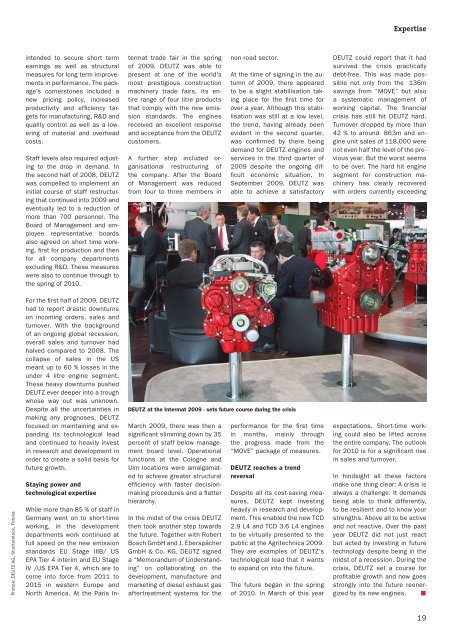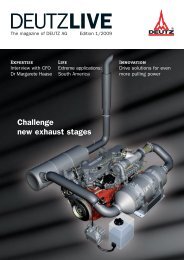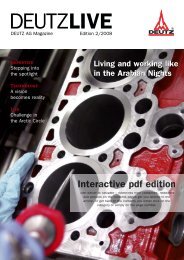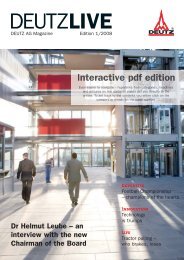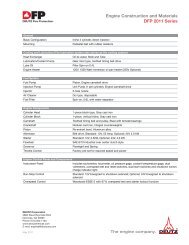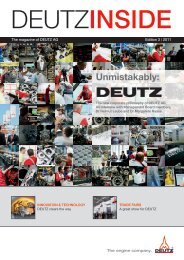New drive – Curtain up for the technology of the future - DEUTZ Home
New drive – Curtain up for the technology of the future - DEUTZ Home
New drive – Curtain up for the technology of the future - DEUTZ Home
Create successful ePaper yourself
Turn your PDF publications into a flip-book with our unique Google optimized e-Paper software.
Photos: <strong>DEUTZ</strong> AG, Shutterstock, Fotolia<br />
intended to secure short term<br />
earnings as well as structural<br />
measures <strong>for</strong> long term improvements<br />
in per<strong>for</strong>mance. The package’s<br />
cornerstones included a<br />
new pricing policy, increased<br />
productivity and efficiency targets<br />
<strong>for</strong> manufacturing, R&D and<br />
quality control as well as a lowering<br />
<strong>of</strong> material and overhead<br />
costs.<br />
Staff levels also required adjusting<br />
to <strong>the</strong> drop in demand. In<br />
<strong>the</strong> second half <strong>of</strong> 2008, <strong>DEUTZ</strong><br />
was compelled to implement an<br />
initial course <strong>of</strong> staff restructuring<br />
that continued into 2009 and<br />
eventually led to a reduction <strong>of</strong><br />
more than 700 personnel. The<br />
Board <strong>of</strong> Management and employee<br />
representative boards<br />
also agreed on short time working,<br />
first <strong>for</strong> production and <strong>the</strong>n<br />
<strong>for</strong> all company departments<br />
excluding R&D. These measures<br />
were also to continue through to<br />
<strong>the</strong> spring <strong>of</strong> 2010.<br />
For <strong>the</strong> first half <strong>of</strong> 2009, <strong>DEUTZ</strong><br />
had to report drastic downturns<br />
on incoming orders, sales and<br />
turnover. With <strong>the</strong> background<br />
<strong>of</strong> an ongoing global recession,<br />
overall sales and turnover had<br />
halved compared to 2008. The<br />
collapse <strong>of</strong> sales in <strong>the</strong> US<br />
meant <strong>up</strong> to 60 % losses in <strong>the</strong><br />
under 4 litre engine segment.<br />
These heavy downturns pushed<br />
<strong>DEUTZ</strong> ever deeper into a trough<br />
whose way out was unknown.<br />
Despite all <strong>the</strong> uncertainties in<br />
making any prognoses, <strong>DEUTZ</strong><br />
focused on maintaining and expanding<br />
its technological lead<br />
and continued to heavily invest<br />
in research and development in<br />
order to create a solid basis <strong>for</strong><br />
<strong>future</strong> growth.<br />
Staying power and<br />
technological expertise<br />
While more than 85 % <strong>of</strong> staff in<br />
Germany went on to short-time<br />
working, in <strong>the</strong> development<br />
departments work continued at<br />
full speed on <strong>the</strong> new emission<br />
standards EU Stage IIIB/ US<br />
EPA Tier 4 interim and EU Stage<br />
IV /US EPA Tier 4, which are to<br />
come into <strong>for</strong>ce from 2011 to<br />
2015 in western Europe and<br />
North America. At <strong>the</strong> Paris In-<br />
termat trade fair in <strong>the</strong> spring<br />
<strong>of</strong> 2009, <strong>DEUTZ</strong> was able to<br />
present at one <strong>of</strong> <strong>the</strong> world’s<br />
most prestigious construction<br />
machinery trade fairs, its entire<br />
range <strong>of</strong> four litre products<br />
that comply with <strong>the</strong> new emission<br />
standards. The engines<br />
received an excellent response<br />
and acceptance from <strong>the</strong> <strong>DEUTZ</strong><br />
customers.<br />
A fur<strong>the</strong>r step included organisational<br />
restructuring <strong>of</strong><br />
<strong>the</strong> company. After <strong>the</strong> Board<br />
<strong>of</strong> Management was reduced<br />
from four to three members in<br />
March 2009, <strong>the</strong>re was <strong>the</strong>n a<br />
significant slimming down by 35<br />
percent <strong>of</strong> staff below management<br />
board level. Operational<br />
functions at <strong>the</strong> Cologne and<br />
Ulm locations were amalgamated<br />
to achieve greater structural<br />
efficiency with faster decisionmaking<br />
procedures and a flatter<br />
hierarchy.<br />
In <strong>the</strong> midst <strong>of</strong> <strong>the</strong> crisis <strong>DEUTZ</strong><br />
<strong>the</strong>n took ano<strong>the</strong>r step towards<br />
<strong>the</strong> <strong>future</strong>. Toge<strong>the</strong>r with Robert<br />
Bosch GmbH and J. Eberspächer<br />
GmbH & Co. KG, <strong>DEUTZ</strong> signed<br />
a “Memorandum <strong>of</strong> Understanding”<br />
on collaborating on <strong>the</strong><br />
development, manufacture and<br />
marketing <strong>of</strong> diesel exhaust gas<br />
aftertreatment systems <strong>for</strong> <strong>the</strong><br />
non-road sector.<br />
At <strong>the</strong> time <strong>of</strong> signing in <strong>the</strong> autumn<br />
<strong>of</strong> 2009, <strong>the</strong>re appeared<br />
to be a slight stabilisation taking<br />
place <strong>for</strong> <strong>the</strong> first time <strong>for</strong><br />
over a year. Although this stabilisation<br />
was still at a low level,<br />
<strong>the</strong> trend, having already been<br />
evident in <strong>the</strong> second quarter,<br />
was confirmed by <strong>the</strong>re being<br />
demand <strong>for</strong> <strong>DEUTZ</strong> engines and<br />
services in <strong>the</strong> third quarter <strong>of</strong><br />
2009 despite <strong>the</strong> ongoing difficult<br />
economic situation. In<br />
September 2009, <strong>DEUTZ</strong> was<br />
able to achieve a satisfactory<br />
<strong>DEUTZ</strong> at <strong>the</strong> Intermat 2009 - sets <strong>future</strong> course during <strong>the</strong> crisis<br />
per<strong>for</strong>mance <strong>for</strong> <strong>the</strong> first time<br />
in months, mainly through<br />
<strong>the</strong> progress made from <strong>the</strong><br />
“MOVE” package <strong>of</strong> measures.<br />
<strong>DEUTZ</strong> reaches a trend<br />
reversal<br />
Despite all its cost-saving measures,<br />
<strong>DEUTZ</strong> kept investing<br />
heavily in research and development.<br />
This enabled <strong>the</strong> new TCD<br />
2.9 L4 and TCD 3.6 L4 engines<br />
to be virtually presented to <strong>the</strong><br />
public at <strong>the</strong> Agritechnica 2009.<br />
They are examples <strong>of</strong> <strong>DEUTZ</strong>’s<br />
technological lead that it wants<br />
to expand on into <strong>the</strong> <strong>future</strong>.<br />
The <strong>future</strong> began in <strong>the</strong> spring<br />
<strong>of</strong> 2010. In March <strong>of</strong> this year<br />
Expertise<br />
<strong>DEUTZ</strong> could report that it had<br />
survived <strong>the</strong> crisis practically<br />
debt-free. This was made possible<br />
not only from <strong>the</strong> €136m<br />
savings from “MOVE” but also<br />
a systematic management <strong>of</strong><br />
working capital. The financial<br />
crisis has still hit <strong>DEUTZ</strong> hard.<br />
Turnover dropped by more than<br />
42 % to around €863m and engine<br />
unit sales <strong>of</strong> 118,000 were<br />
not even half <strong>the</strong> level <strong>of</strong> <strong>the</strong> previous<br />
year. But <strong>the</strong> worst seems<br />
to be over. The hard hit engine<br />
segment <strong>for</strong> construction machinery<br />
has clearly recovered<br />
with orders currently exceeding<br />
expectations. Short-time working<br />
could also be lifted across<br />
<strong>the</strong> entire company. The outlook<br />
<strong>for</strong> 2010 is <strong>for</strong> a significant rise<br />
in sales and turnover.<br />
In hindsight all <strong>the</strong>se factors<br />
make one thing clear: A crisis is<br />
always a challenge. It demands<br />
being able to think differently,<br />
to be resilient and to know your<br />
strengths. Above all to be active<br />
and not reactive. Over <strong>the</strong> past<br />
year <strong>DEUTZ</strong> did not just react<br />
but acted by investing in <strong>future</strong><br />
<strong>technology</strong> despite being in <strong>the</strong><br />
midst <strong>of</strong> a recession. During <strong>the</strong><br />
crisis, <strong>DEUTZ</strong> set a course <strong>for</strong><br />
pr<strong>of</strong>itable growth and now goes<br />
strongly into <strong>the</strong> <strong>future</strong> reenergized<br />
by its new engines. $<br />
19


